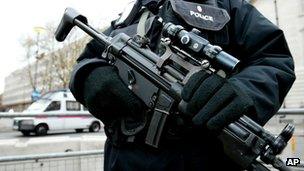New terror laws could be less effective, warns watchdog
- Published
- comments

The government replaced control orders with the new regime of T-Pims this year
The new system for restricting terror suspects could prove less effective than control orders, the independent reviewer of terror laws has said.
David Anderson QC warned the new two-year limit onTerrorism Prevention and Investigation Measures (T-Pims), externalcould "strengthen the resolve" of terrorists.
They may have compromised under previous longer restrictions, he said.
His comments came in aparliamentary report, externalon control orders. The Home Office said it was considering them.
Mr Anderson said the two-year limit on T-Pims - unless new evidence emerges - could encourage some hardened terror suspects to try to wait out the period before resuming their activity.
He warned: "The ability to maintain restrictions for more than two years was of obvious utility in the case of a person who could still not be prosecuted or deported... and had not been de-radicalised."
The longest time someone was under a control order was almost five years.
'Untested evidence'
Control orders were the Labour government's controversial answer to targeting suspected terrorists believed to be dangerous when there was insufficient evidence to prosecute. They lasted for six years from 2005.
Fifty-two people were subject to them, almost half British nationals.
Under control orders, a person's movements and communications were severely restricted by bans, curfews and surveillance.
They cost around £17m - a figure that does not include secret details of the significant cost of surveillance by MI5 and the police.
In his final review of control orders, Mr Anderson said he had good reason to believe they fulfilled their primary functions of disrupting terrorist activity.
But he added they relied heavily on "untested evidence", and there was a "troubling feeling" of imposing orders on some people who had already been acquitted of terrorism offences.
'Just keeping an eye'
Under the new laws introduced earlier this year, there are fewer controls but greater police scrutiny of suspects.
One of the key elements of control orders - forcibly relocating suspects - has not been continued under T-Pims and was a principle part of the coalition government's reform.
Mr Anderson said relocation was "undoubtedly effective" in some cases, and its advantages were not easily replicated.
Speaking to the BBC, Mr Anderson acknowledged the coalition was seeking to address this: "I don't criticise the government... What they've done to try and diminish the difference, if you like, is to allocate more money to surveillance.
"Of course they are not complete substitutes. When you relocate someone you actually disrupt them, whereas when you place them under surveillance you're really just keeping an eye on them."
It is believed more than 100 extra officers were recruited in a bid to increase police security under the new regime.
'Safe and free'
A Home Office spokesperson said: "We are grateful to David Anderson for his considered report and we are currently considering the recommendations with other relevant agencies.
"T-Pims provide effective powers to deal with the risks posed by individuals we can neither prosecute nor deport, and we have made available substantial extra funding for covert surveillance and investigation."
Civil liberty campaign groups expressed frustration with Mr Anderson's report.
Sophie Farthing of Liberty said: "The reviewer's labelling of T-Pims as 'less effective' than control orders is baffling - the two are fundamentally the same, both operating outside the criminal justice system.
"Rebranding exercises and minor tweaks don't change the fact that these punitive measures are as unfair as they are unsafe.
"If these people are dangerous, why not prosecute them?"
The Justice Secretary Ken Clarke recently wrote: "The primary role of any government is to keep its citizens safe and free.
"That means both protecting them from harm and protecting their hard-won liberties."
Not ready to cope
In assessing the overall threat to the UK's national security since the change, Mr Anderson quotes the head of MI5, Jonathan Evans, who said "there should be no substantial increase in overall risk".
In the months before the change from control orders to T-Pims at the end of last year, the BBC was told of concerns among some senior counter-terror officers that they were not ready to cope with the extra demands of the new system.
The Home Office briefly delayed the transition in January.
Nine men - all British - were subject to the new measures when they were introduced at the beginning of the year.
The government has published draft proposals for "enhanced T-Pims", which are more restrictive. But they would only be used in extreme circumstances.
Assistant Commissioner Cressida Dick, who is in charge of counter-terrorism at the Metropolitan Police, told Parliament she thought only a credible report of "concurrent attacks" would justify using the enhanced powers.
- Published25 January 2012
- Published26 January 2011
- Published3 January 2011